Adata chairman says AI datacenters are gobbling up hard drives, SSDs, and DRAM alike — insatiable upstream demand could soon lead to consumer shortages
The GPU shortage during COVID could soon look like child's play.

AI datacenters are eating up the world's supply standard DRAM memory, NAND flash for SSDs, and hard drives. Adata chairman Simon Chen just made it extremely clear that in his three-decade tenure in the industry, he's never witnessed a simultaneous shortage of all of the aforementioned components, via a DigiTimes Asia report.
Chen goes on to explicitly state that Adata and its usual competitors aren't fighting between themselves for supply in what would be businesss as usual. Instead, cloud service providers (CSPs) — almost always AI datacenters in this day and age — are now gobbling up all available capacity of these components.
As if all that wasn't enough, Chen believes that the shortage of hard drives is incentivizing customers to try and purchase SSDs for non-volatile storage needs instead, further twisting the spiral of storage scarcity. Adata's sales team has purportedly gotten instructions to "sell sparingly" and "give priority to loyal customers" in turn.
Additionally, the inventory at upstream suppliers is charitably described as barebones, with only two to three weeks' worth of supply, down from the usual two-to-three months of capacity. In other words, that means that SK hynix, Samsung, Micron, Kioxia, and Western Digital are selling most everything they make to AI projects.
In case you're not entirely convinced of how big a deal Chen's suspicion-confirming statements are, Adata had a 11% share in the SSD market in 2024, and holds a 5% slice of the memory market. Those are small percentages, but they're for the entire world, meaning that Adata purchases memory and flash chips at large volumes and careful negotiated prices. The deals are likely done multiple months in advance, and Adata certainly would otherwise have far bigger negotiation power than, say, Joe's Discount Memory.
The company's stock price has climbed sky-high since August, and it hit a 15-year revenue high in Q2 2025. That's keeping in tandem with the general industry trend, with DRAM revenue jumping 17.1% in the past fiscal quarter, and enterprise SSD revenue boosting by 12.7%. Even CPU/GPU chipmakers are charging gigantic premiums for their top-shelf wares, too.
All of this AI-fueled demand is now affecting the supply chain for all modern consumer electronics. Most any advanced device, including phones, TVs, consoles, and cars, all need one or more of the components that are now in high demand. If you're on the fence on whether to purchase a new handset, computer, or television, you'd be wise to consider moving sooner rather than later. Even if AI isn't taking all of our jobs, it seems poised to take all of our silicon.
Get Tom's Hardware's best news and in-depth reviews, straight to your inbox.
Follow Tom's Hardware on Google News, or add us as a preferred source, to get our latest news, analysis, & reviews in your feeds.


Bruno Ferreira is a contributing writer for Tom's Hardware. He has decades of experience with PC hardware and assorted sundries, alongside a career as a developer. He's obsessed with detail and has a tendency to ramble on the topics he loves. When not doing that, he's usually playing games, or at live music shows and festivals.